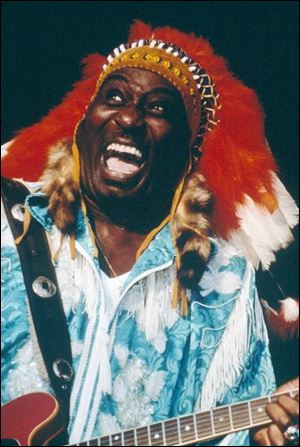
Toledo Blues Festival will include a Chicagoan with Cherokee roots
7/13/2003
Eddie "The Chief" Clearwater will perform Saturday in Toledo.
Next weekend's Toledo Blues Festival will feature one of the music world's most unusual collaborations: Eddy “The Chief” Clearwater, a Mississippi-born bluesman with Cherokee roots, will share the Promenade Park stage Saturday night with Los Straitjackets, a Nashville-based surf-rock instrumental band that performs wearing Mexican wrestling masks.
“We had a lot of fun in the studio,” said Clearwater, speaking of the disc “Rock 'n' Roll City” which he recorded with Los Straitjackets and is due for release Aug. 12 on Bullseye Blues/Rounder Records. “They put their masks on, and I put my headdress on. It was quite interesting.”
Also performing at the free downtown festival will be Johnny Drummer and the Starlighters, A.C. Reed and the Spark Plugs, Detroit blues divas Odessa Harris and Alberta Adams, and Toledoans Big Blues Bob and the Thin Ice Band.
Clearwater, a singer-guitarist, was born Eddie Harrington in Macon, Miss., in 1935. He said he grew up listening to the Delta blues performed by local musicians along with country-western music on the jukebox. But the self-taught guitarist's primary music education came from playing in church.
“I was always in church. That was a way of life where I was from,” Clearwater said in a recent interview. “A lot of your blues music, rhythm and blues, and soul music comes from gospel. It's all rooted in gospel music.”
Although he owned only an acoustic guitar, Clearwater loved the sound of electrified blues and was thrilled when his uncle, Houston Harrington, a part-time musician, part-time minister, and part-time record company owner, invited him to come to Chicago in 1950, where the urban blues was blossoming.
“He sent me a ticket to come on a Greyhound bus, and I said I was on my way. The ticket cost $15,” Clearwater said.
“All the blues people were there. My uncle had met Little Walter, Jimmy Reed, Howlin' Wolf, Elmore James, Magic Sam - they were all there at that time. That's why I was all gung-ho to come. He said he would introduce me to some of these people and I couldn't wait.”
When he arrived on the city's West Side, he soaked up the music scene at night and washed dishes during the day to earn a few bucks.
“I never had an electric guitar until I came to Chicago,” Clearwater said. “I got a job at Little Jack's Restaurant washing dishes and busing tables. Right next door to the restaurant was a pawn shop. They had an Epiphone guitar and amp in the window. Every day on my lunch hour, I would go and look at the guitar. I asked how much it cost. `$175.' Every week I got paid, I put something in the bank. I finally saved enough money to buy it.”
The switch to electric guitar “was amazing,” Clearwater said. “I was quite fascinated with the sound coming through an amp and all that. It gave me more incentive, more inspiration, to play.”
The city's thriving electric-blues scene, with clubs on almost every corner and music played around the clock, was everything he had hoped it would be.
“`This was my world. This is it,' I thought. `How could it be better than this?' I just had such great inspiration.”
Clearwater's Uncle Houston came through again, this time with a recording opportunity.
“I did my first recording on Uncle Houston's label, Atomic H Records, called “Boogie Woogie Baby” and “Hillbilly Blues,” my first 45. That was about 1955 or '56,” Clearwater said.
In January, 2001, Clearwater opened his own Chicago blues club called Eddie Clearwater's Reservation Blues at North Avenue and Milwaukee Street - “kind of an artsy part of town,” he said. “A lot of yuppies live in that area.”
After playing in clubs around the country for decades, he said it's “still hard to sink in” that at that club, he's the chief in more ways than one.
“I've been around so many clubs all my adult life so it's really different just to be there and say, `Am I the owner of this club?'” Clearwater said. He's enjoyed having the opportunity to invite some of his favorite blues buddies to perform, including Robert Lockwood, Jr., Hubert Sumlin, Bobby Rush, and Carey Bell.
“It's a lot of fun to be there with them and to really enjoy playing music with them.”
He said he'll be bringing his trademark headdress to Toledo.
“Oh, absolutely. I won't leave home without it,” Clearwater said.